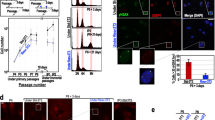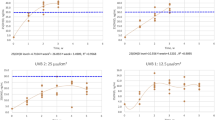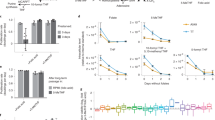Abstract
The ability of vitamin A and its analogues (retinoids) to prevent chemically-induced tumours has been studied in various experimental systems1. We have investigated here the possibility that retinoids might also inhibit radiation-induced oncogenic transformation using a cell line of C3H mouse embryo fibroblasts grown in culture. We report a marked reduction in the transformation frequency by using one such compound, Ro-11-1430, the synthesis and structure of which has been described by Bollag2.
This is a preview of subscription content, access via your institution
Access options
Subscribe to this journal
Receive 51 print issues and online access
$199.00 per year
only $3.90 per issue
Buy this article
- Purchase on Springer Link
- Instant access to full article PDF
Prices may be subject to local taxes which are calculated during checkout
Similar content being viewed by others
References
Sporn, M. B., Dunlop, N. M. Newton, D. L. & Smith, J. M. Fedn Proc. 35, 1332–1338 (1976).
Bollag, W. Chemotherapia 21, 236–247 (1975).
Reznikoff, C. A., Brankow, D. W. & Heidelberger, C. Cancer Res. 33, 3231–3238 (1973).
Reznikoff, C. A., Bertran, J. S., Brankow, D. W. & Heidelberger, C. Cancer Res. 33, 3239–3249 (1973).
Terzaghi, M. & Little, J. B. Cancer Res. 36, 1367–1374 (1976).
Miller, R. C. & Hall, E. J. Nature 272, 58–60 (1978).
Borek, C. & Sachs, L. Nature 210, 276–278 (1966).
Borek, C. & Hall, E. J. Nature 243, 450–453 (1973); 252, 499–501 (1974).
Trown, P. W., Buck, M. J. & Hansen, R. Cancer Treat. Rep. 60, 1647–1653 (1976).
Bollag, W. Eur. J. Cancer 10, 731–737 (1974).
Chu, E. W. & Malmgren, R. A. Cancer Res. 25, 884–895 (1965).
Saffiotti, U., Montesano, R., Sellakumar, A. R. & Borg, S. A. Cancer 20, 857–864 (1967).
Cone, M. V. & Nettesheim, P. J. natn. Cancer Inst. 50, 1599–1606 (1973).
Moon, R. C., Grubbs, C. J. & Sporn, M. B. Cancer Res. 36, 2626–2630 (1976).
Sporn, M. B. et al. Nature 253, 47–50 (1975).
Lasinitzki, I. & Goodman, D. S. Cancer Res. 34, 1564–1571 (1974).
Chopra, D. P. & Wilkoff, L. J. J. natn. Cancer Inst. 58, 923–930 (1977).
Wilkoff, L. J., Peckham, J. C., Dulmadge, E. A., Mowry, R. W. & Chopra, D. P. Cancer Res. 36, 964–972 (1976).
Author information
Authors and Affiliations
Rights and permissions
About this article
Cite this article
HARISIADIS, L., MILLER, R., HALL, E. et al. A vitamin A analogue inhibits radiation-induced oncogenic transformation. Nature 274, 486–487 (1978). https://doi.org/10.1038/274486a0
Received:
Accepted:
Issue Date:
DOI: https://doi.org/10.1038/274486a0
This article is cited by
-
Dietary vitamin A, beta carotene and risk of epidermoid lung cancer in South-Western France
European Journal of Epidemiology (1990)
Comments
By submitting a comment you agree to abide by our Terms and Community Guidelines. If you find something abusive or that does not comply with our terms or guidelines please flag it as inappropriate.



